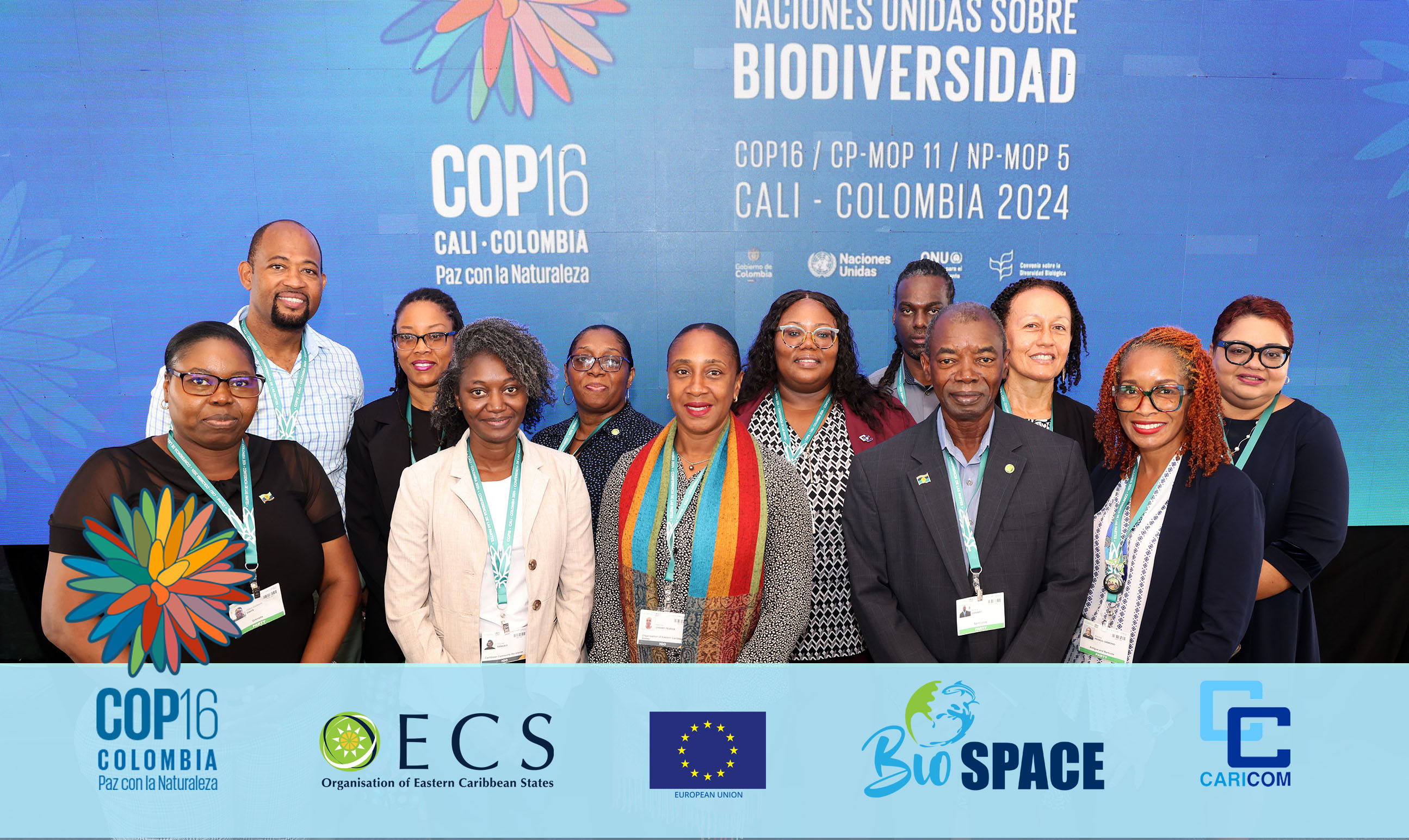The OECS Champions Caribbean Biodiversity at COP16 in Colombia
OECS Media Release
The Organisation of Eastern Caribbean States (OECS) has reaffirmed its commitment to biodiversity conservation and sustainable development during the Sixteenth Conference of the Parties (COP16) to the Convention on Biological Diversity (CBD), held in Cali, Colombia. Representing the interests of Small Island Developing States (SIDS) and coastal nations, the OECS delegation played a pivotal role in advancing regional priorities.
At COP16, several decisions were delivered, including the establishment of a global fund to share benefits derived from the uses of digital sequence information on genetic resources (DSI) more fairly and equitably. This decision is particularly significant for the OECS region, with Saint Kitts and Nevis, Saint Lucia, and Antigua and Barbuda being parties to the Nagoya Protocol on Access and Benefit Sharing (ABS).
The adoption of a new Programme of Work under Article 8(j) enhances the contributions of Indigenous Peoples and Local Communities (IPLCs) to the objectives of the Convention. These objectives encompass the conservation and sustainable use of biological diversity, as well as the fair and equitable sharing of benefits arising from its use.
In addition, to strengthen the role of Indigenous people and local communities (IPLCs), Parties adopted a new Programme of Work on Article 8(j) and other provisions of the Convention relating to Indigenous peoples and local communities. The programme of work sets out specific tasks to ensure the meaningful contribution of Indigenous peoples and local communities towards the three objectives of the Convention while ensuring that their rights, contributions and traditional knowledge are further embedded in the global agenda:
- The conservation of biological diversity;
- The sustainable use of biological diversity, and
- The fair and equitable sharing of benefits), as well as the implementation of the Kunming-Montreal Global Biodiversity Framework (KMGBF). Through this Programme.
COP16 also advanced initiatives on synthetic biology, invasive alien species, biodiversity and climate change, capacity building, technical cooperation, and biodiversity and health. While progress was made, efforts to secure $200 billion annually by 2030 for biodiversity initiatives and to redirect $500 billion per year in harmful subsidies remain ongoing. A new global financing instrument for biodiversity is under consideration to support these goals. Dedicated biodiversity funds also saw significant developments. The Global Biodiversity Framework Fund (GBFF) has garnered nearly US $400 million in pledges to date, including $163 million announced during COP16. This fund targets support for small island states and economies in transition. Additionally, the Kunming Biodiversity Fund (KBF), launched with an initial US $200 million from China, aims to accelerate action on the 2030 Agenda and SDG targets, and 2050 goals of the Kunming-Montréal Global Biodiversity Framework, particularly in developing countries.
Furthermore, evaluation of the effectiveness of the Global Environment Facility (GEF), which serves as the financial mechanism of the Convention, was considered. The evaluation highlighted significant progress by the GEF in resource mobilisation and in supporting activities that advance the objectives of the Convention on Biological Diversity (CBD).
The GEF’s report to COP 16 noted that during the first two years of its current funding cycle (GEF-8), it approved $2.42 billion in direct support for the implementation of the Kunming-Montreal Global Biodiversity Framework (KMGBF). This substantial contribution underscores the importance of continued efforts by countries in the OECS region to fully utilize the resources available through the GEF for biodiversity conservation and management.
Recognising the critical role of COP 16 in advancing biodiversity conservation in the region, the OECS Commission, in collaboration with CARICOM, organised extensive training for new delegates ahead of the meeting. These preparations included mock negotiations and strategic planning sessions, equipping the OECS delegation to effectively advocate for regional priorities such as marine biodiversity conservation and invasive species management.
The OECS delegation at COP16 gave support to the regional negotiators and also hosted side events that highlighted impactful initiatives in the Caribbean. One notable presentation, “Strengthening Capacity for Environmental Management in the Eastern Caribbean,” showcased the BioSPACE project, a collaboration with the European Union (EU) that focuses on the conservation of marine and coastal biodiversity and enhancing environmental management capacity, among other things. Another side event on sustainable livelihoods discussed community-based solutions for conserving coastal ecosystems and promoting local resilience.
Biodiversity underpins economic growth, human health, and environmental resilience. Over half of global GDP depends on biodiversity, with industries such as agriculture and tourism thriving on healthy ecosystems. Moreover, biodiversity contributes significantly to medicine, offering natural compounds essential for combating diseases. As the COP16 agenda continues, key pending decisions, including a global monitoring framework, are expected to shape the future of biodiversity conservation. The OECS remains steadfast in its mission to leverage global resources and partnerships to safeguard the region’s unique ecosystems.
For more information about the OECS BioSPACE Project, visit:: https://oecs.int/en/biospace-ilm
Danny Moonie
OECS Communications Unit









